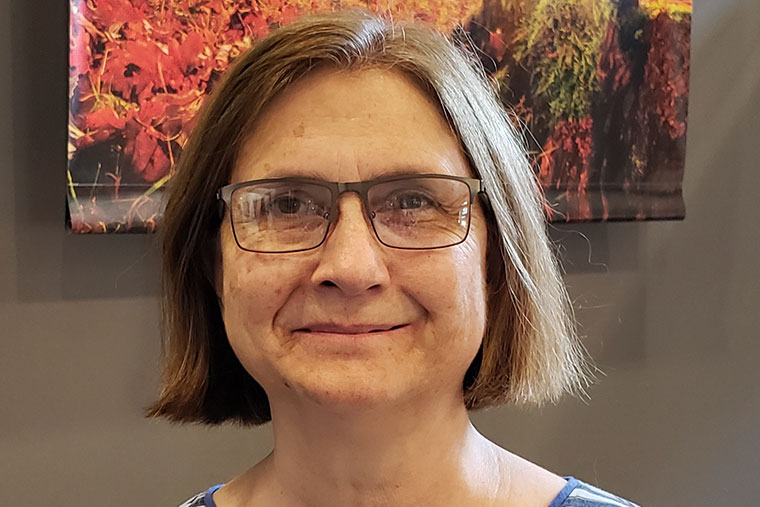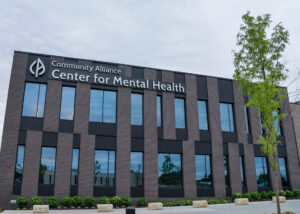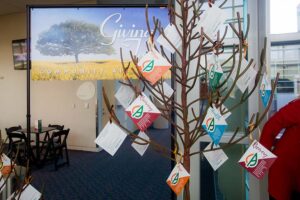Making Peer Support a Virtual Experience

Loneliness and isolation and its impact on clients has been a key concern for the team at Community Alliance throughout the pandemic. “We know that the very measures needed to protect physical health during this time – things like social distancing, wearing masks and limiting face-to-face contact – can negatively impact mental health,” Aileen Brady, Community Alliance COO, explained. “So we looked at different ways to proactively address this concern and, with the help of federal emergency mental health funding, called on Mary Ahern, Community Alliance’s peer support supervisor, to help create an ongoing support group virtually.”
Leadership from a Place of Understanding
Mary has been a part of Community Alliance for nearly 10 years, starting with her involvement in the Day Rehabilitation Program. “Day Rehab gave me the skills to move on. Then, I volunteered to help facilitate classes,” Mary offered. “When there was a part-time position open for a Peer Support Specialist, I applied for the job and got it! From there I became a full-time staff member and then became a supervisor.”
“At Community Alliance, we operate under four domains: home, health, purpose and community. With this peer support telehealth program, we focused on community and it worked – starting our first online peer support classes with 20 individuals.”
Learning Thriving Skills
“In our classes we try not to refer to ‘coping skills’ because that sounds like you are simply trying to cope with a mental health issue. It sounds like you’re just getting by. Instead, we like to say ‘thriving skills’, which means the person is growing in their recovery.”
“In this group we really advocate for one another. For example, several people in the group wanted to change their housing. We talked about resources and options and helped each other out. Group members are especially interested in employment services like Community Alliance’s employment program, and they’ve even formed friendship bonds where they are offering recommended reading lists and sharing books. Members of the group really look out for each other,” Mary said.
Telehealth Peer Support is available four days a week – with different areas of focus:
- COVID-related issues
- Recovery topics
- Self esteem
- Communication skills and more
Everyone in the group is encouraged to develop and practice their own motto that is meaningful and significant for each individual. Group participants are all encouraged to find something that’s going to work for them. “It’s very personal and they really take it to heart. We revisit and make a point to ask everyone how that statement or motto is working to help them in their life,” Mary explained. “If we think someone is feeling down on a particular day, we’ll stop the group and go around to everyone on the Zoom call and we’ll each say something encouraging to them. Or we’ll offer a thriving skill we’ve used ourselves that they can use to help boost their mood,” Mary continued.
Support, Encourage, Empathize, Educate, Motivate and Advocate
Peer Support Services at Community Alliance, including the telehealth class, uses a formula called the SEEEMA model which means Support, Encourage, Empathize, Educate, Motivate and Advocate. When peers meet one-on-one, or as a group of individuals, this model provides a guide for interaction based on what the individual needs at that time. This model was developed by Jai Sookram, PhD, Program Manager for Family Education and Peer Support Services at Community Alliance. The model is effective in part because relationships between peers is based on mutual support and empowerment. Relationships are made strong because peers support and encourage each other based on recovery experience that enables recovery and thriving beyond illnesses. We heal better in peer relationships than in isolation.
“We have one member of our group who was feeling worthless. She didn’t speak up often and she had extremely low self-esteem. However, she had no problem telling other people they were worthwhile,” Mary observed. “Now, she has established her own motto which is encouraging for her, saying and believing she is truly worthwhile. And now she is the first to offer up answers for our brain games or share during our topic discussions.”
“Another success story is with an individual that wouldn’t look in the camera on the Zoom calls, because he felt unattractive,” Mary continued. “As a group, we made a point of encouraging him to look at us – saying things like. ‘Oh, you’re handsome!’ or ‘You look like a college student.’ We just kind of helped him to accept himself and feel comfortable with himself, just as he is. Today, he gives credit to the group for this big shift in focus to where he can say, ‘I look good!’ These are the things that really warm my heart.”
Coming Together in Real Life
The whole Telehealth Peer Support community has come together. Since the group is now fully vaccinated, they are anticipating the time when everyone can come together in person for a celebration. Everyone in the group is abuzz about their upcoming potluck party and excited to plan what they’ll contribute. “They know what type of food they’re bringing. One gentleman’s going to make Chinese. Someone else signed up to bring egg salad. Another gentleman has volunteered to bring two bottles of pop and maybe cookies. Another group member is going to make a cherry delight,” Mary mentioned. “And the fellow who used to be self-conscious and was terribly worried over his looks? He’s offered to DJ the music and plan games.”
Help is Within Reach
At Community Alliance, we offer a full range of integrated health services including primary and psychiatric care, mental health and substance use counseling, rehabilitation and employment services, supportive housing, community, family and peer supports and more.
Resources:
Psychiatric and Counseling Services



